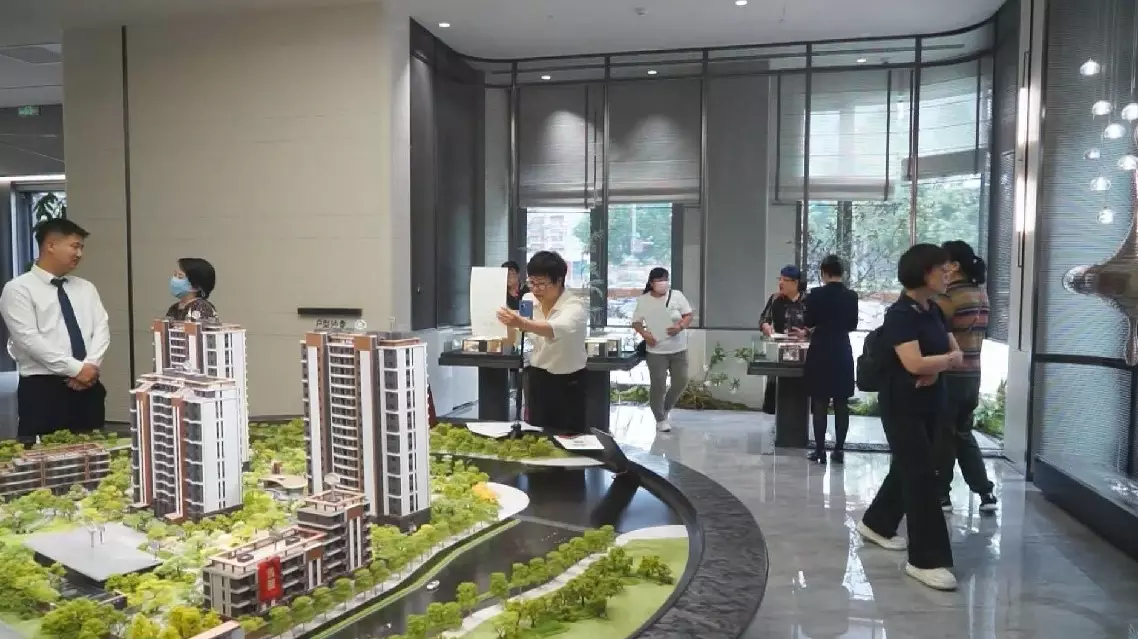Major Chinese cities including the Chinese capital of Beijing and the cities of Shanghai, Guangzhou and Shenzhen have rolled out new policies to ease restrictions for home buyers, boosting buyers' confidence and increasing sales.
Beijing announced on Monday that it would lower the threshold for non-locals to buy real estate in the downtown area.
According to a circular jointly issued by six municipal departments on Monday night, non-Beijing residents will be allowed to purchase homes inside the city's fifth ring road if they have a record of paying social insurance or individual income tax in the city for at least three years -- down from five years as was previously required.
The new policies to take effect on Tuesday will also lift the housing purchase restrictions in Tongzhou District, where the Beijing Municipal Administrative Center is located, to allow the district's home-buying rules to comply with the city's unified property market policy.
Under the new rules, homebuyers will face less financial pressure, as the minimum down payment ratio for individual commercial mortgages is reduced from 20 percent to 15 percent for first-home purchases, and from 30 percent to 20 percent for second homes.
For families with more than two children in Beijing, the amount of the housing provident fund loan limit will be raised by 400,000 yuan (about 57,083 U.S. dollars), the circular said.
Following the adoption of the new policies, the numbers of inquiries and appointments for viewings of many new properties in Beijing have increased. Given the positive response by homebuyers, experts say the new policies are very targeted and will affect the market for a long time.
The city of Guangzhou in south China's Guangdong Province has lifted all restrictions on buying properties, the first to do so among the four first-tier cities in China.
Starting on Monday, qualifications for purchasing a home will no longer be reviewed and there will be no restrictions on the number of homes purchased by families and single individuals with or without local household registration in the city, according to a circular issued by the general office of the municipal government on Sunday night.
Many properties and real estate agencies in the city received phone inquiries and visits from clients about the new policies on Monday.
"A proprietor came to ask for our opinion on the full removal of home-buying restrictions. He said he was willing to sell if the price was right," said a local real estate agent.
Also on Sunday, the city of Shenzhen in Guangdong Province announced measures such as reducing the down payment ratio and optimizing district-specific home purchase restrictions.
It then became a sleepless night for many resale home buyers, who reached many deals in the middle of the night.
On online platforms, the prices went up by tens or hundreds of thousands of yuan only a few minutes after the announcement of the new policies.
"At least 30 percent of our home owners have adjusted prices, almost all up 10 percent. For homes previously at 5 million yuan, the current price is generally 5.5 million yuan or 5.6 million yuan," said Cheng Peng, manager of a local real estate agency.
Resale home agencies in the city have also been crowded since Sunday, with contracts signed one after another.
"From 21:00 on Sunday to the early hours of Monday, our signing rooms were fully occupied by clients who were negotiating and signing contracts. Most of them didn't leave until midnight and beyond. Some left at 3:00 or 4:00. On Sunday night, 11 deals were reached here," said Liang Fuchao, director of a local resale homes contract signing service center.
In Shanghai, the minimum down payment ratio for individual commercial mortgages will be reduced from 20 percent to 15 percent for first-home purchases, and from 35 percent to 25 percent for second homes, according to a circular issued Sunday.
Commercial banks will be guided to lower existing mortgage rates to further reduce mortgage interest expenditures for home buyers. Non-Shanghai residents will be allowed to purchase homes outside the outer ring road if they have a record of paying social insurance or individual income tax in the city for at least one year -- down from three years as was previously required, the circular said.
The new measures will take effect on Tuesday.
The Shanghai property market, which had already seen rebounds in sales of both new and resale homes in the last week of September, is expecting a busy first week of October, although it's the National Day holiday.
"Some of our agents went back home to spend the holiday, but they will return to their posts soon. This morning (Sunday), we have already received eight or nine groups of clients, which is two or three times the previous figure," said Zhong Guangle, director of a Homelink real estate brokerage service center.

Property buyers in China's major cities gain confidence as new policies take effect









